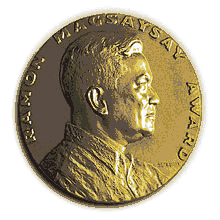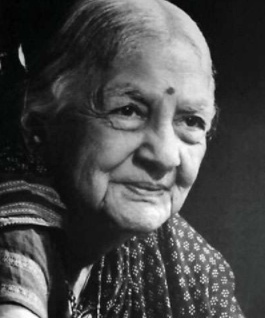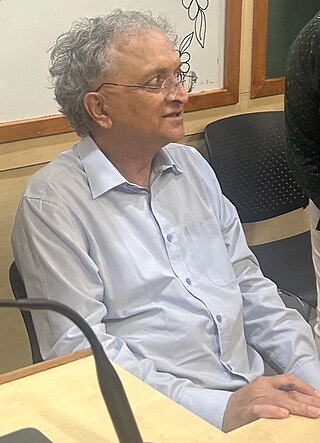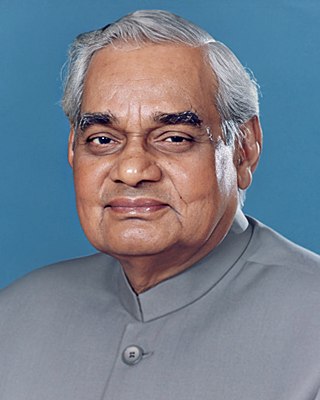
The Ramon Magsaysay Award is an annual award established to perpetuate former Philippine President Ramon Magsaysay's example of integrity in governance, courageous service to the people, and pragmatic idealism within a democratic society. The prize was established in April 1957 by the trustees of the Rockefeller Brothers Fund based in New York City with the concurrence of the Philippine government. It is often called the "Nobel Prize of Asia".
The Sangh Parivar refers, as an umbrella term, to the collection of Hindutva organisations spawned by the Rashtriya Swayamsevak Sangh (RSS), which remain affiliated to it. These include the political party Bharatiya Janata Party, religious organisation Vishva Hindu Parishad, students union Akhil Bharatiya Vidyarthi Parishad (ABVP), religious militant organisation Bajrang Dal that forms the youth wing of the Vishva Hindu Parishad (VHP), and the worker's union Bharatiya Kisan Sangh. It is also often taken to include allied organisations such as the Shiv Sena, which share the ideology of the RSS.

Bankim Chandra Chattopadhyay was an Indian novelist, poet, essayist and journalist. He was the author of the 1882 Bengali language novel Anandamath, which is one of the landmarks of modern Bengali and Indian literature. He was the composer of Vande Mataram, written in highly Sanskritised Bengali, personifying India as a mother goddess and inspiring activists during the Indian Independence Movement. Chattopadhayay wrote fourteen novels and many serious, serio-comic, satirical, scientific and critical treatises in Bengali. He is known as Sahitya Samrat in Bengali.

Rukmini Devi Arundale was an Indian theosophist, dancer and choreographer of the Indian classical dance form of Bharatanatyam, and an activist for animal welfare.

The Hindu American Foundation is an American Hindu non-profit advocacy group founded in 2003. The organisation has its roots in the Hindu nationalist organisation Vishwa Hindu Parishad America and its student wing Hindu Students Council.

Kamaladevi Chattopadhyay was an Indian social reformer. She has worked for the promotion of Indian handicrafts, handlooms, and theatre in independent India to uplift the socio-economic standard of Indian women. She is the first woman in India to contest in elections from Madras Constituency, but lost.

Ramachandra "Ram" Guha is an Indian historian, environmentalist, writer and public intellectual whose research interests include social, political, contemporary, environmental and cricket history, and the field of economics. He is an important authority on the history of modern India.
Stephen Alter is an American author of more than 20 books of fiction and non-fiction. He was born in Mussoorie, India and much of his writing focuses on the Indian Himalayas and the broader Himalayan region. His novel, Birdwatching, received the 2023 Green Book of the Year Award at the Green Literature Festival, Bengaluru. Wild Himalaya: A Natural History of the Greatest Mountain Range on Earth received the 2020 Banff Mountain Book Award in the Mountain Environment and Natural History category and the 2021 Kekoo Naoroji Award for Himalayan Literature. It was also shortlisted for the Kamaladevi Chattopadhyay NIF Prize. Becoming a Mountain: Himalayan Journeys in Search of the Sacred and the Sublime received the 2015 Kekoo Naoroji Award. In The Jungles of the Night: A Novel about Jim Corbett was shortlisted for the DSC South Asian Literature Award.

Atal Bihari Vajpayee was an Indian politician who served thrice as Prime Minister of India, first from 16 May to 1 June 1996, and then from 19 March 1998 to 22 May 2004. A member of the Bharatiya Janata Party (BJP), Vajpayee was the tenth Prime Minister. He headed the BJP-led National Democratic Alliance in the Indian Parliament, and became the first Prime Minister unaffiliated with the Indian National Congress to complete a full five-year term in office. He died at the age of 93 on Thursday 16 August 2018 at 17:05 at AIIMS, New Delhi.
Meera Nanda is an Indian writer and historian of science, who has authored several works critiquing the influence of Hindutva, postcolonialism and postmodernism on science, and the flourishing of pseudoscience and vedic science. Meera Nanda taught History of Science at the Indian Institute of Science Education and Research (IISER) Mohali from 2009 to 2017, and later - from 2019 to 2020 - she was a Guest Faculty in Humanities and Social Sciences at IISER Pune. In 2023 she became a fellow with the Committee for Skeptical Inquiry.
KHAM stands for Koli Kshatriya, Harijan, Adivasi and Muslim. Here Kshatriya is taken to include the Kolis. In the KHAM combine, Kolis were the largest caste represented at different levels of politics, and Madhavsinh Solanki increased the reservation quota for Other Backward Classes in Gujarat. The theory was propounded by Madhavsinh Solanki in 1980s in Gujarat to create vote bank for Indian National Congress and prepared by Jhinabhai Darji. Using the formula, Congress was able to capture 149 seats in the 182-member Assembly. However the formula alienated Patels permanently from Congress. during the Kham alliance, castes such as Bania, Patidar and Brahmins lost their importance in the state, so they propounded the Anti reservation agitation in 1981 and 1985 in Gujarat to get rid of the power of OBC castes.

The 1985 Gujarat riots began in February 1985 and lasted till August, in the Indian state of Gujarat. Most of the rioting occurred in the city of Ahmedabad; some other cities, including the state capital of Gandhinagar, were also affected. Between 220 and 275 people were killed in the violence, while several thousands of others were injured, and tens of thousands were displaced. The riots also caused widespread property damage.
Jasleen Dhamija (1933-2023) was an Indian textile art historian, crafts expert and former UN worker. Based in Delhi, she was best known for her pioneering research on the handloom and handicraft industry, especially history of textiles and costumes. She was professor of living cultural traditions at the University of Minnesota. Over the years, during her career as a textile revivalist and scholar, she authored several books on textiles, including Sacred Textiles of India (2014).
Hilla Rustomji Faridoonji (1872–1956) was an Indian educationist and political activist.

Aanchal Malhotra is an Indian oral historian, author and artist, known for her work on the Partition of India. Her research and writings focus on the oral histories of individuals affected by the Partition, capturing their memories and the tangible remnants of that period.

Divya Dwivedi is an Indian philosopher and author. She is an associate professor at the Indian Institute of Technology, Delhi. Her work includes a focus on philosophy of literature, aesthetics, philosophy of psychoanalysis, narratology, revolutionary theory, critical philosophy of caste and race, and the political thought of Gandhi. She is the co-author of Gandhi and Philosophy: On Theological Anti-politics and Indian Philosophy, Indian Revolution: On Caste and Politics.

Amandeep Sandhu is a Punjabi writer and journalist who writes in English. His second novel Roll of Honour was nominated for Hindu Literary Prize for Best Fiction in 2013.
The Women's suffrage movement in India fought for Indian women's right to political enfranchisement in Colonial India under British rule. Beyond suffrage, the movement was fighting for women's right to stand for and hold office during the colonial era. In 1918, when Britain granted limited suffrage to women property holders, the law did not apply to British citizens in other parts of the Empire. Despite petitions presented by women and men to the British commissions sent to evaluate Indian voting regulations, women's demands were ignored in the Montagu–Chelmsford Reforms. In 1919, impassioned pleas and reports indicating support for women to have the vote were presented by suffragists to the India Office and before the Joint Select Committee of the House of Lords and Commons, who were meeting to finalize the electoral regulation reforms of the Southborough Franchise Committee. Though they were not granted voting rights, nor the right to stand in elections, the Government of India Act 1919 allowed Provincial Councils to determine if women could vote, provided they met stringent property, income, or educational levels.
The Kamaladevi Chattopadhyay NIF Book Prize is awarded annually for non-fiction books on modern or contemporary India which were published in the preceding year. The Prize was established in 2018 by the New India Foundation, a charitable trust that also awards research fellowships and book grants to Indian scholars and writers. Winners of the prize include politician and writer Jairam Ramesh, and historian Ornit Shani, and authors shortlisted for the prize include Aanchal Malhotra, Sujatha Gidla, Katherine Eban, Christophe Jaffrelot, Piers Vitebsky, Alpa Shah, and Manoranjan Byapari.
When Crime Pays: Money and Muscle in Indian Politics is a 2017 book by senior fellow at the Carnegie Endowment for International Peace and political scientist, Milan Vaishnav, exploring the connection between criminality and democracy in Indian politics. The book uses statistics from official sources to investigate what explains the supply, demand and fielding of criminals by political parties in elections. It received the first Kamaladevi Chattopadhyay NIF Book Prize in the year 2018.











